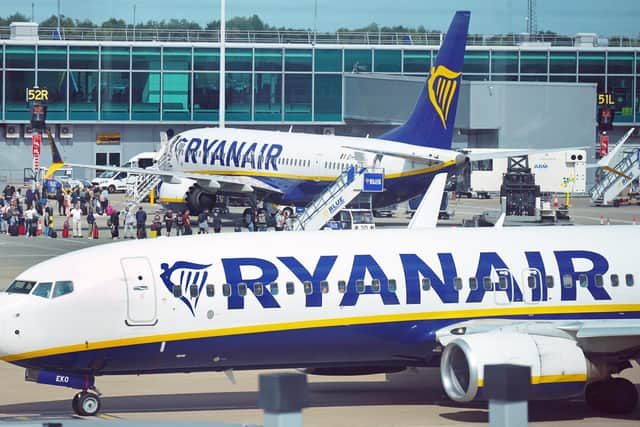Ryanair invests in Yorkshire as it reveals profits have bounced back
The airline said that it carried more than twice the number of passengers compared with a year ago, which helped to push up revenue. This fed further down the balance sheet as pre-tax profit reached 1.4bn euros (£1.2bn) in the first six months of the year, compared to a loss of 100m euros just a year earlier.
The company carried a record number of passengers in the second quarter and average ticket prices were around 14 per cent higher than before the pandemic, bosses said. It was enough to offset the drop in fare prices in the first three months of the year as Russia’s attack on Ukraine pushed down ticket prices in Europe. Revenue more than tripled to 6.6bn euros (£5.79bn) during the six months and Ryanair carried 95.1m passengers, a jump of 143 per cent.
Advertisement
Hide AdAdvertisement
Hide AdFor the airline – as for most businesses – costs also soared. The company’s operating costs rose from 2.2bn euros to nearly five billion euros (£4.39bn). The business has escaped some of the chaos that has hit some of its rivals. It has bought around four-fifths of its fuel in advance at 67 dollars a barrel, locking in lower prices earlier.
Fuel prices have soared in the last year and by comparison the fuel that Ryanair is buying in advance for next year has cost it an average of 93 dollars per barrel. Meanwhile, the company also avoided some of the impact from a soaring dollar by buying the dollars it plans to spend on buying aircraft in advance up until 2026 at 1.24 dollars per euro.
On the open market the exchange rate was 99 euro cents to the dollar on Monday morning. Ryanair said that delays in the delivery of Gamechanger aircraft it has ordered is weighing on the business.
“Our growth is being hampered by Boeing’s inability to meet its delivery schedule in Q3, despite their previous assurances that Ryanair deliveries would be ‘prioritised’,” said chief executive Michael O’Leary.
Advertisement
Hide AdAdvertisement
Hide Ad“We expect Boeing will only deliver ten or 12 of the contracted 21 Gamechangers due before Christmas. Boeing assure us that they will deliver all scheduled 51 Gamechangers ahead of peak summer 2023, although there is a risk that some of these deliveries could slip.”


Mr O’Leary added: “While we remain dependent on Boeing meeting their delivery commitments, especially for Christmas extras and spring mid-term, we are modestly raising our 2023 financial year traffic guidance to 168m passengers (previously 166.5 million), up 13 per cent on our pre-Covid traffic.”
Last month, Ryanair revealed it will provide flights to 15 destinations from Leeds Bradford Airport over the winter as part of its long term investment in Yorkshire.
Ryanair will operate more than 100 weekly flights from the airport as part of its winter programme to destinations including Alicante, Malaga, the Canary Islands, Riga and Warsaw. The airline said it will have three aircraft based at Leeds Bradford over the winter, which represents a $300m investment and will directly support 90 jobs.
Advertisement
Hide AdAdvertisement
Hide AdSpeaking last month Ryanair’s Head of Communications, Jade Kirwan told The Yorkshire Post: “We had a very strong summer throughout the UK as a whole, and this is reflected in our winter schedule.
"We are planning 15 new routes for the winter schedule this year at Leeds Bradford Airport to seven different countries. We are delivering 20 per cent increase in capacity at Leeds Bradford compared with the pre-pandemic winter of 2019.”
”